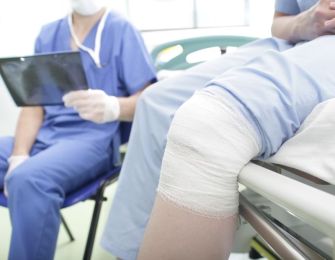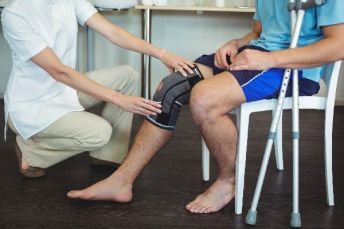 Much like your elbow, your knee holds a compact bundle of nerves. This network is something that you probably think very little about until you happen to bump it. Much like the funny bone, it can send waves of pain radiating through your body leaving your limbs feeling like much-abused tuning forks. If you have knee pain inside of your knee, a recent bump or bruise may have caused some nerve irritation.
Much like your elbow, your knee holds a compact bundle of nerves. This network is something that you probably think very little about until you happen to bump it. Much like the funny bone, it can send waves of pain radiating through your body leaving your limbs feeling like much-abused tuning forks. If you have knee pain inside of your knee, a recent bump or bruise may have caused some nerve irritation.
There are other reasons why this type of discomfort might occur. For example, you might be dealing with arthritis. This condition typically occurs whenever there is inflammation in the joints. Your knees are the joints that you use the most, to walk, get up, sit down, jump, and change elevation. Due to their constant use, they are generally among the first joints to experience the pain and discomfort of arthritis.
When arthritis is an issue, you can consult with your doctor about using anti-inflammatory medications as a means of therapy. It is also a good idea to implement an anti-inflammatory diet. This often means limiting your consumption of red meats, alcohol and above all things, white sugar and other simple carbohydrates. By reducing inflammation in the whole body, arthritis flare-ups will be less frequent, less severe, and much shorter in their duration.
Another common cause of this discomfort is hormonal change. This situation can be induced if you are a gym enthusiast with a rigorous body-building routine that includes the use of either prohormones or steroids. Hormones perform essential functions like keeping your joints lubricated and moderating inflammation. Some people experience discomfort as a result of mid-life hormonal changes. When this is the case, consult with your doctor about using natural strategies to balance out your chemical composition.
There are lots of reasons why you might be experiencing stiffness and soreness in this particular area. A short, sharp ding that connects with the sensitive nerves at the knee interior can cause latent pain for quite some time. Hormonal changes, significant weight gain, and arthritis are common causes of this discomfort as well. Scheduling an appointment with your doctor will be the quickest way to identify the source of the problem and to develop a plan for resolving it.
To discuss knee pain inside the knee and possible solutions, contact Dr. Dan Albright at 919-863-6808.
 Preparing well for your surgery can make a huge difference in your recovery. The earlier you start planning for your operation, the better. Here are some tips to keep in mind when preparing for partial knee replacement surgery.
Preparing well for your surgery can make a huge difference in your recovery. The earlier you start planning for your operation, the better. Here are some tips to keep in mind when preparing for partial knee replacement surgery. Preparing well for your surgery can make a huge difference in your recovery. The earlier you start planning for your operation, the better. Here are some tips to keep in mind when preparing for partial knee replacement surgery.
Preparing well for your surgery can make a huge difference in your recovery. The earlier you start planning for your operation, the better. Here are some tips to keep in mind when preparing for partial knee replacement surgery.
 When you have pain in your knee, you want to resolve it once and for all. After trying multiple non-surgical solutions, there may come a time when you opt for surgery. Before you head into the operating room, there are some things you must know about
When you have pain in your knee, you want to resolve it once and for all. After trying multiple non-surgical solutions, there may come a time when you opt for surgery. Before you head into the operating room, there are some things you must know about  Having healthy and robust knees is crucial when executing day-to-day activities. At times, accidents and injuries occur, and you require surgery. In the case of knee surgery, the recovery may be challenging. Depending on the patient’s physical health and fitness before the surgery, recovery may take anywhere from six weeks to one year. So, how can you recover from
Having healthy and robust knees is crucial when executing day-to-day activities. At times, accidents and injuries occur, and you require surgery. In the case of knee surgery, the recovery may be challenging. Depending on the patient’s physical health and fitness before the surgery, recovery may take anywhere from six weeks to one year. So, how can you recover from  It is vital to maintain strong, healthy knees to perform daily activities. A single fall can keep you from enjoying leisure activities or carrying out your everyday routine. An operation may be needed to resolve an issue and get you back to health. On average, it takes six months for recovery and up to a year before being able to do strenuous physical activities. There are several tips to help with a faster recovery after
It is vital to maintain strong, healthy knees to perform daily activities. A single fall can keep you from enjoying leisure activities or carrying out your everyday routine. An operation may be needed to resolve an issue and get you back to health. On average, it takes six months for recovery and up to a year before being able to do strenuous physical activities. There are several tips to help with a faster recovery after  If you are planning on having your knee repaired or replaced, it is crucial to keep your doctors informed of changes in health or habits. Without this information, these professionals cannot possibly deliver the level of needs-specific care and attention that you require. Following are a few things that your
If you are planning on having your knee repaired or replaced, it is crucial to keep your doctors informed of changes in health or habits. Without this information, these professionals cannot possibly deliver the level of needs-specific care and attention that you require. Following are a few things that your  The legs are the human body’s wheels that carry us from place to place. However, knee pain can be debilitating and prevent standard functionality and performance. Whether due to water build-up, loose cartilage, or swelling and arthritis,
The legs are the human body’s wheels that carry us from place to place. However, knee pain can be debilitating and prevent standard functionality and performance. Whether due to water build-up, loose cartilage, or swelling and arthritis, 


